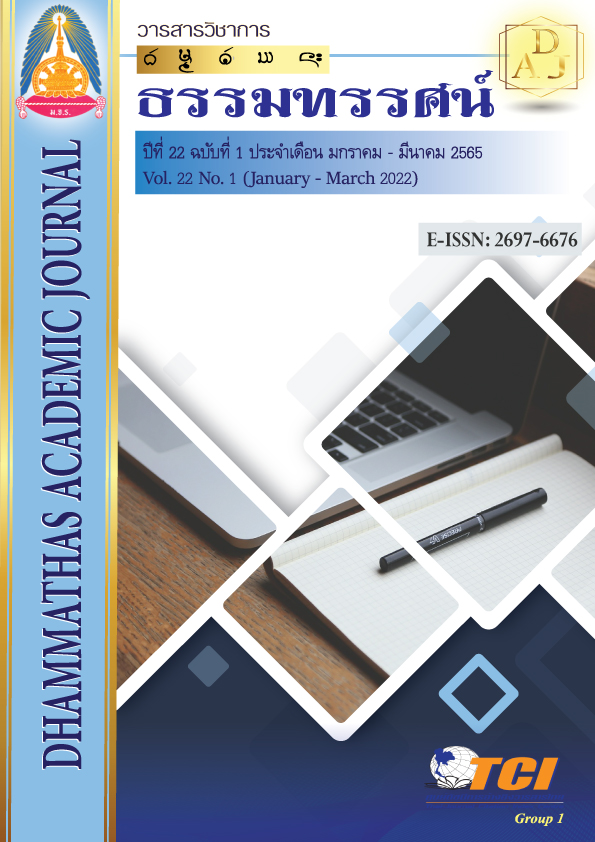รูปแบบสังคมสงเคราะห์เชิงพุทธบูรณาการของสมาคมสตรีอาเซียนจังหวัดกาฬสินธุ์
Main Article Content
บทคัดย่อ
การวิจัยครั้งนี้ มีวัตถุประสงค์เพื่อ 1) ศึกษาหลักพุทธธรรมที่เกี่ยวข้องกับการสังคมสงเคราะห์เชิงพุทธบูรณาการในพระพุทธศาสนา 2) ศึกษารูปแบบการสังคมสงเคราะห์เชิงพุทธบูรณาการของสมาคมสตรีอาเซียนจังหวัดกาฬสินธุ์ 3) เสนอรูปแบบสังคมสงเคราะห์เชิงพุทธบูรณาการของสมาคมสตรีอาเซียน จังหวัดกาฬสินธุ์ เป็นการวิจัยเชิงคุณภาพ โดยการสัมภาษณ์เชิงลึก การสังเกต และการสนทนากลุ่ม
ผลการวิจัยพบว่า
1. หลักพุทธธรรมที่เกี่ยวข้องกับการสังคมสงเคราะห์เชิงพุทธบูรณาการในพระพุทธศาสนา: ศึกษาหลักคำสอนเรื่องการสังคมสงเคราะห์ที่ปรากฏในคัมภีร์ที่เหล่าสาวกนำมาบูรณาการในการสอนสังคม
2. รูปแบบการสังคมสงเคราะห์เชิงพุทธบูรณาการของสมาคมสตรีอาเซียนจังหวัดกาฬสินธุ์: ได้มีการจัดรูปแบบในการดำเนินการใน 5 ด้าน ได้แก่ การให้บริการสังคม การศึกษา สาธารณะประโยชน์ การสืบสานวัฒนธรรม และการเผยแผ่ธรรมะ
3. รูปแบบสังคมสงเคราะห์เชิงพุทธบูรณาการของสมาคมสตรีอาเซียนจังหวัดกาฬสินธุ์: ได้นำสังคหวัตถุ 4 มาเป็นรูปแบบในการทำสังคมสงเคราะห์ คือ 1) ทาน จัดในรูปแบบของโครงการ kalasin Happiness model คนกาฬสินธุ์ไม่ทิ้งใครไว้ข้างหลัง โครงการสร้างพลังรักสู่ผู้พิการ โครงการปันน้ำใจช่วยกาชาด โครงการส่งมอบกำลังใจในช่วงเทศกาล โครงการวัยแก้ว วัยใส เติมวัคซีนใจ สานสายใย
ส่งเสริมคุณธรรม เป็นต้น 2) ปิยวาจา ในรูปแบบโครงการเรียนภาษาเพื่อเตรียมการเมื่อเข้าสู่ประชาคมอาเซียน เป็นต้น 3) อัตถจริยา ในรูปแบบโครงการเสริมสร้างอาชีพสตรีเพื่อสร้างโอกาสและความหวังในชีวิต โครงการทัวร์ท่องเที่ยวพัฒนาศักยภาพ 10 ประเทศในอาเซียนและทัวร์ภายในประเทศ 4) สมานัตตตา ได้จัดเป็นรูปแบบตามโครงการทั้ง 5 ด้าน
Article Details

อนุญาตภายใต้เงื่อนไข Creative Commons Attribution-NonCommercial-NoDerivatives 4.0 International License.
เพื่อให้เป็นไปตามกฎหมายลิขสิทธิ์ ผู้นิพนธ์ทุกท่านต้องลงลายมือชื่อในแบบฟอร์มใบมอบลิขสิทธิ์บทความ ให้แก่วารสารฯ พร้อมกับบทความต้นฉบับที่ได้แก้ไขครั้งสุดท้าย นอกจากนี้ ผู้นิพนธ์ทุกท่านต้องยืนยันว่าบทความ ต้นฉบับที่ส่งมาตีพิมพ์นั้น ได้ส่งมาตีพิมพ์เฉพาะในวารสาร วิชาการธรรม ทรรศน์ เพียงแห่งเดียวเท่านั้น หากมีการใช้ ภาพหรือตารางของผู้นิพนธ์อื่นที่ปรากฏในสิ่งตีพิมพ์อื่นมาแล้ว ผู้นิพนธ์ต้องขออนุญาตเจ้าของลิขสิทธิ์ก่อน พร้อมทั้ง แสดงหนังสือที่ได้รับการยินยอมต่อบรรณาธิการ ก่อนที่บทความจะได้รับการตีพิมพ์เอกสารอ้างอิง
กรมการปกครอง. (2560). การขอจัดตั้งสมาคม. เอกสารจดทะเบียนสมาคมสตรีอาเซียนกาฬสินธุ์. กรุงเทพฯ: กรมการปกครอง กระทรวงมหาดไทย.
จิดาภา เร่งมีศรีสุข. (2560). พุทธภาวะผู้นำของผู้บริหารองค์กรปกครองท้องถิ่นเพื่อสร้างการมีส่วนร่วมเชิงบูรณาการ ในจังหวัดพระนครศรีอยุธยา. (รายงานการวิจัย). นนทบุรี: มหาวิทยาลัยเทคโนโลยีราชมงคลสุวรรณภูมิ.
ทรูปลูกปัญญา. (2563). การสังคมสงเคราะห์ในปัจจุบันทั้งภาครัฐบาลและเอกชน. เข้าถึงได้จาก https://www. trueplookpanya.com/ blog/content/64534
พระใบฏีกาสุพจน์ ตปสีโล (เกษนคร). (2551). บทบาทการส่งเสริมพระพุทธศาสนาของอุบาสิกาบงกชสิทธิพล. (รายงานการวิจัย). อุบลราชธานี: มหาวิทยาลัยมหาจุฬาลงกรณราชวิทยาลัย.
มหาจุฬาลงกรณราชวิทยาลัย. (2539). พระไตรปิฎกภาษาไทย ฉบับมหาจุฬาลงกรณราชวิทยาลัย. กรุงเทพฯ: มหาจุฬาลงกรณราชวิทยาลัย.
สุริยนต์ น้อยสงวน. (2560). รูปแบบการปฏิบัติงานสาธารณสงเคราะห์ของคณะสงฆ์ในจังหวัดศรีสะเกษ. (ดุษฎีนิพนธ์พุทธศาสตรดุษฎีบัณฑิต). พระนครศรีอยุธยา: มหาวิทยาลัยมหาจุฬาลงกรณราชวิทยาลัย.

